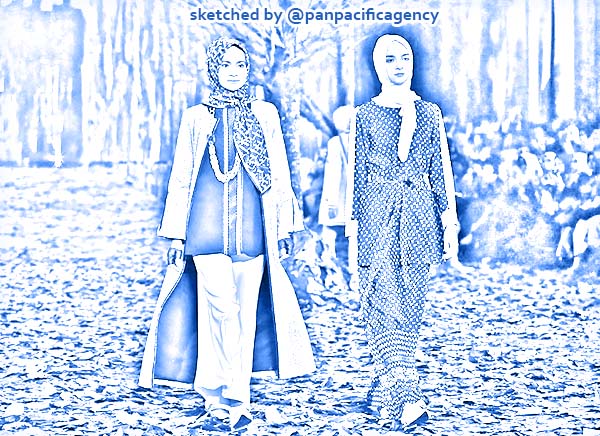[Analytics] Indonesia aims to be global hub of modest fashion

Homage: Local fashion designer Ivan Gunawan’s modestwear collection for Idul Fitri was a tribute to the late Karl Lagerfeld through the use of tweed and decor. (Handout/Muara Bagdja Team). Sketched by the Pan Pacific Agency.
As the world’s largest Muslim-majority country, Indonesia is aiming to be the center of modest fashion amid tight competition from major Muslim nations and from minority countries producing apparel with big brands. Fashion consultant and co-founder of Modest Fashion Weeks Franka Soeria said recently that Indonesia could attain the status by creating a modest fashion hub, improving production and diversifying designs for the international market, reported The Jakarta Post.
She added that designers needed to follow the trends and demands in different countries such as Germany, where minimalist styles were popular, and the United Arab Emirates (UAE), where people liked glamorous looks.
“Fashion business is not just about showing designers’ creations but it is also about branding and selling,” Franka said, adding that Indonesia’s modest wear designers had yet to prioritize international marketing.
However, she believed that Indonesia’s modest fashion industry had a positive trajectory in the future even though it had to face competition from abroad.
“Most Muslim-majority countries such as Malaysia, Turkey and Saudi Arabia have claimed they are the leaders in modest fashion, but I can say that the title is still up for grabs,” she said in a Modest Fashion Founders Fund (MFFF) event in Jakarta on Friday, last week.
The event was hosted by the Creative Economy Agency (Bekraf). The MFFF is an acceleration program by Bekraf for modest fashion business owners, in which designers are trained in business development, and given easier access to sharia-based funding from various banks such as Bank Mandiri Syariah and BNI Syariah.
According to a 2018 report on the Global Islamic Economy (GIE), Indonesia had the third-largest expenditure for Muslim apparels, worth US$20 billion in 2017, after Turkey with $28 billion and the UAE with $22 billion.
The report ranked Indonesia as the second-largest modest fashion producer after the UAE in terms of the development, governance, awareness and social aspects of the sector.
Indonesia must also face competition from Muslim-minority countries such as Italy, where models in hijabs and modest wear have stepped across the catwalk for major international brands such as Dolce & Gabbana.
Big retail clothing companies, such as H&M from Sweden with its 4,743 stores in over 50 countries and Marks & Spencer from Britain with its 1,487 outlets worldwide, have also launched modest clothing lines.
Bekraf deputy for capital access Fadjar Hutomo said he had high hopes for the nation’s modest fashion industry as it was the second-biggest contributor (with an 18 percent share) to Indonesia’s GDP in the creative economy, just behind the culinary sector (with 41.8 percent) in 2016.
“Modest wear is one of the fastest-growing creative sectors, not only because Indonesia is a big market for Muslim wear but also because we have many modest fashion designers,” he said.
An MFFF finalist, Halida Sofia, 29, said that in 2009 she started introducing her brand, Dressofia, for women’s daily wear but she rebranded it for a modest wear line in 2017 after requests from her predominantly hijab-wearing customers.
After the rebrand, Dressofia is a modest wear brand with influences from the traditional Korean hanbok dress.
“Modest fashion is a growing sector and we have a lot of new players now. I think this is a good sign because the competition can make modest wear more affordable,” she said, adding that she had sold her fashion products to, among others, Malaysia, Brunei, Hong Kong, Taiwan and Turkey.
The report predicted that the modest fashion industry’s contribution to the global Islamic economy would likely increase from $270 billion in 2017 to $361 billion in 2023, making it the third-largest contributor after Islamic finance’s $3.81 trillion and Halal food’s $1.86 trillion.
According to the report, Indonesia is the 10th global Islamic economy driver. Its neighboring country, Malaysia has been the leader in the Islamic economy for five consecutive years, followed by the UAE, Bahrain and Saudi Arabia.